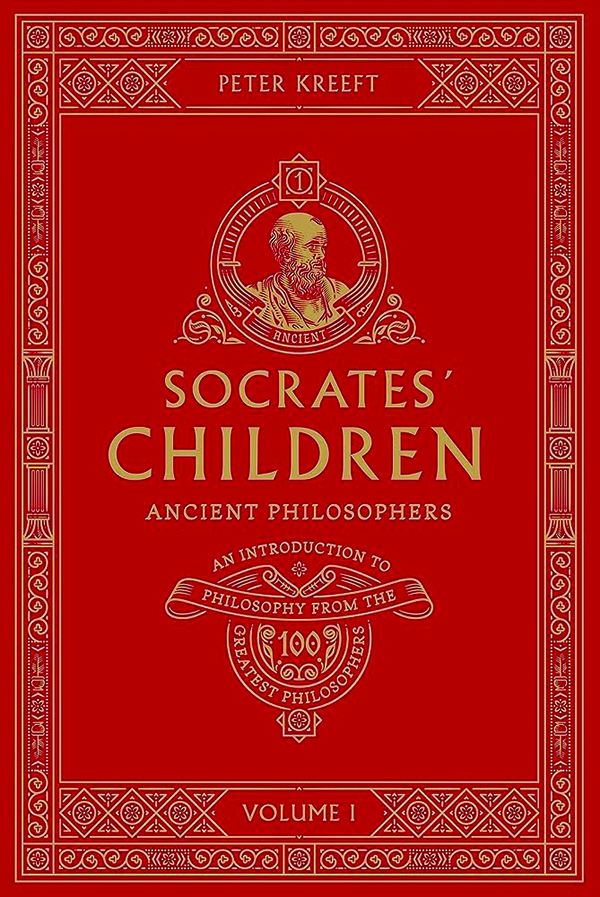
Philosophy’s history, handsomely bound and smartly written
Daniel Ross Goodman
Why think? For the entirety of human history up until this year this would have been such a bizarre question that even posing it would have put the questioner at risk of appearing eccentric, if not downright loony. Do we really need to justify an activity that is so basic that we tend to not even, well, think about it?

A magnificent new work makes the case that there is nothing more worthwhile, through an engaging history of philosophical thought. Socrates’ Children, by Boston College professor Peter Kreeft, offers the most enjoyable, accessible, and aesthetically appealing history of philosophy readers are likely to ever come across this side of the surprising smash 1945 hit A History of Western Philosophy by Bertrand Russell. It is also a work that demonstrates why careful, consistent thinking, especially when done with an awareness of those who have done it the best in the past, is indispensable to our flourishing in the present and future.
A BETTER LOOK AT JAMES GARFIELD
For those of us who may not have given philosophy a second thought because we associate it with mind-numbing linguistic analysis or impossibly convoluted compound German words, Kreeft assures us that philosophy is not some scary jargon-filled game of mental Twister fit to be pursued only by the most highly skilled mental athletes. That, too, is part of philosophy, says Kreeft, but only in the way that garbage collection is a part of restaurants. (For anyone else who has ever tried to trudge through Wittgenstein, you’ll be loving every minute of Kreeft’s disses of this kind of intellectual torture known as “analytic philosophy.”) What philosophy really is, declares Kreeft, is the pursuit of wisdom — the ability to discern the meaningful from the meaningless. And it is for everyone. When we tune out distractions and engage in open-ended question-and-answer sessions with ourselves and with others, we’re better able to arrive at clearer pictures of what may have otherwise been foggy ideas of what it is that we actually believe, why we believe it, and whether these beliefs are true or false, and how these beliefs may or may not be helping us lead the kinds of lives we actually want to be living.
The history of the human pursuit of wisdom is long and complex, but it need not be told in an overly long and complex manner. This is the beauty of Kreeft’s wonderful four-volume work: it recounts the complex history in a brief and felicitous way, through short summaries of the 100 greatest philosophers from Solomon to Chesterton. Listicle opponents be damned; this is not some hastily dashed-off ranking of thinkers meant to be the middlebrow bookstore equivalent of internet clickbait. Foregrounding the philosophers rather than their philosophies makes it easier as well as more enjoyable to learn about them. The ranking is not arbitrary, either. Kreeft is convinced that the ideal manner of teaching the history of philosophy is through a “great books” approach, concentrating on the philosophers whose works and ideas have been the most influential and that have stood the test of time. In justifying his approach, Kreeft wisecracks, “Why anyone would oppose ‘great books’ blows my mind. Do they prefer tiny books, shallow books, or stupid books?”
Wokists and canon-deconstructionists be damned as well. Thus, Plato and Aristotle make Kreeft’s cut, while Emil Cioran and Slavoj Zizek do not. As much as I resonate with this approach, it does raise the question of why, say, A.J. Ayer and Bernard Lonergan are included in Kreeft’s canon while Jurgen Habermas and Robert Nozick are not. While Kreeft’s concise summaries of his 100 greatest provide ample justification for including the thinkers he chose to include, he does not provide much explanation for his omissions. While I suppose that giving an account of why he omitted hundreds of worthy philosophers could have easily spawned its own multi-volume work, having been able to see an NCAA Tournament Selection Sunday-style livestream of the day Kreeft chose his 100 greatest philosophers accompanied by tweet-length explanations of why certain significant on-the-bubble thinkers didn’t make his cut would have been a compelling venture in its own right, as well as surprisingly entertaining.
CLICK HERE TO READ MORE FROM THE WASHINGTON EXAMINER
The No. 1 overall seed in Kreeft’s bracket is that much-mythologized, sometimes-mocked, perpetually relevant, and reputedly very ugly fourth-century B.C. Greek thinker who never actually wrote a single book of philosophy but whom the entire Western tradition of philosophy regards as its founding father. This of course would be Socrates, the teacher of Plato, the “grand”-teacher of Aristotle, and “probably the second most important and influential human being who ever lived, next to Jesus,” in Kreeft’s estimation. (Somewhere in heaven Moses is waving his hands around like a desert island castaway who’s spotted an ocean liner and going, “HEY! Over here! Can you see me?! I’m over HERE!”) Socrates also provides the title for this collection, because in Kreeft’s mind, although there were important thinkers before Socrates, Socrates “was the first great philosopher.” And his disciple Plato was potentially even greater, in large part due to how effective he was in spreading his master’s teachings. Plato was to Socrates as Matthew, Mark, Luke, John, and Paul were to Jesus, Kreeft analogizes. Like Jesus, Socrates wrote nothing. “He was too busy doing it to publish it,” Kreeft quips, to the lament of every assistant professor wishing their tenure applications worked this way. Kreeft compares the importance of Plato’s pupil Aristotle to the West to the primacy of place that Confucius holds in the East.
As to why the book is titled Socrates’ Children, we have to turn to Kreeft’s argument as to how influence and inheritance works in philosophy: Although there were many thinkers who contested many aspects of Socrates’s philosophy that Plato and Aristotle espoused, all subsequent philosophers can legitimately be called “Socrates’ Children” in the sense that they are all part of one big, not always happy family of philosophers for whom “Socrates is its main patriarch.” If we take up Kreeft on his offer to explore the wondrous history of philosophy through learning about its 100 greatest exponents, we may have a chance of one day joining this accomplished family ourselves. At the very least, reading about these thinkers should spur us to do our own thinking about goodness, truth, and the nature of existence. Engaging in this sort of thinking was precisely what allowed Socrates, Plato, Aristotle, and at least 97 others to contribute so much to human civilization.
Daniel Ross Goodman is a Washington Examiner contributing writer and a Harvard Divinity School postdoctoral fellow. His latest book, Soloveitchik’s Children: Irving Greenberg, David Hartman, Jonathan Sacks, and the Future of Jewish Theology in America was published by the University of Alabama Press.
